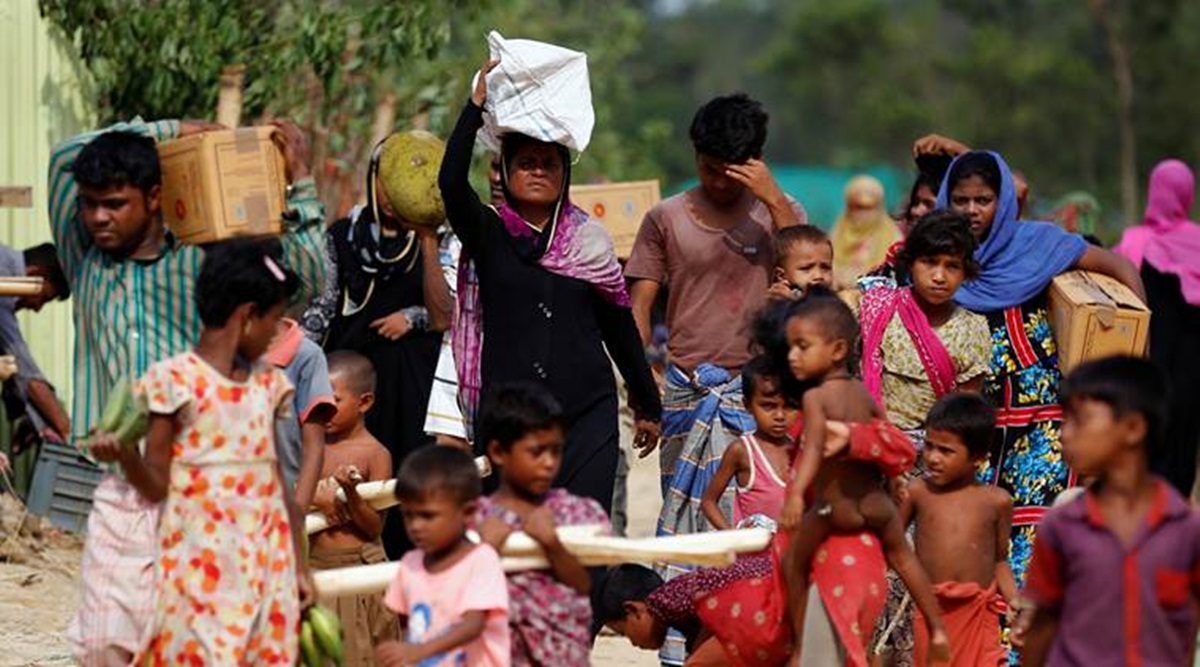
Rohingyas in India fleeing to Bangladesh for safety and refuge

A series of arrests of Rohingyas attempting trying to cross over to Bangladesh from India in the past weeks indicates an emerging trend of reverse migration triggered by forceful deportation of some members of the refugee community to Myanmar.
A BSF team on Monday (May 2) arrested 24 Rohingyas, including 10 children, from the state’s Unakoti district. Many among those arrested were possessing refugee cards issued by the United Nations High Commissioner for Refugees (UNHCR).
After preliminary investigation, police said, the group came from Jammu by train to Tripura via Kolkata in West Bengal and Guwahati in Assam. They planned to cross over to Bangladesh through the international border at Kailashahar, police suspect.
Series of arrests
Earlier, on April 28, six Rohingiyas were arrested by Tripura police at Dharmanagar Railway Station soon after they arrived from New Delhi by Tripura Sundari Express. They too were reportedly planning to sneak into Bangladesh. One woman in the group was carrying UNHCR’s refugee card.
Prior to the two back-to-back arrests in Tripura, the Government Railway Police (GRP) arrested 13 members of the community, including six children and two women, at New Jalpaiguri railway station in West Bengal. They reached the NJP railway station in two groups from Jammu and New Delhi, the railway police said, and were waiting to board an Assam-bound train.
During preliminary interrogation, the group told the police that they had planned to go to the Rohingya camp in Bangladesh by sneaking out of India through the international border in Tripura. They were arrested under the Foreigners’ Act for travelling without proper travel documents.
An estimated 40,000 Rohingyas live in India. Of them, at least 20,000 are registered with the UNHCR as refugees.
Heightened insecurity
Rights groups see the trend as a fallout of heightened insecurity among the community following renewed cases of detention and a case of forceful deportation of a Rohingya woman to Myanmar by the Government of India.
In March this year, a 37-year-old Rohingya woman, Hasina Begum, was deported from Jammu to Myanmar, a country she fled to escape persecution in 2012. “She was deported despite holding a UNHCR’s refugee card and objecting to her push back through the international border in Moreh in Manipur by the Manipur Human Rights Commission,” said Sabber Kyaw Min, director of the New Delhi-based Rohingya Human Rights Initiative.
The commission had said her deportation would be a violation of the constitutional right to life.
International law prohibits the forced return of refugees to places where their lives or freedom would be threatened. India, however, is not a signatory to the UN Refugee Convention of 1951 or its 1967 Protocol. The country also does not have a clear refugee policy.
Perception of Rohingyas
Ever since the BJP came to power in 2014, India has viewed the Rohingya issue as a “security threat” rather than a humanitarian crisis. Last year, the Union government had announced plans to deport Rohingya refugees currently lodged in detention centres. The government made clear its plan after the Supreme Court had refused to stay their deportation.
Hasina was among the 170 refugees detained in Jammu on March 6, 2021 and lodged in Hiranagar Jail, considered as “holding centres” for Rohingyas to undergo verification process for deportation. Her three children aged 14, 13 and 9 years are now stranded in Jammu without their mother.
Meenakshi Ganguly, South Asia director at Human Rights Watch, termed the government’s action as “cruel disregard for human life and international law.” The HRW said the deportation highlighted the life-threatening risk Rohingya refugees are facing in India.
Min said they also got some unconfirmed reports of another Rohingya man, Jafar Alam, being deported to Myanmar from Jammu.
Since October 2018, India has deported 12 Rohingyas to Myanmar, as per rights groups. The government, however, maintained that they left voluntarily.
The day Hasina was deported, the authorities in Jammu detained 25 Rohingya refugees and sent them to Hiranagar holding centre for pre-deportation verification.
Also read: US to declare Rohingya repression in Myanmar a genocide
Amnesty India said the detention was an “abject dereliction of India’s human rights obligations and an egregious violation of international law.”
There are 235 Rohingya refugees, including around 20 minors, reportedly lodged at the Harinagar holding centre to undergo nationality verification needed for their deportation. These developments contributed to the sense of insecurity, Min said.
Also read: Rohingya children face a dark future without healthcare & education
“As per our estimate, around 600 Rohingya refugees have gone to Bangladesh since March this year because of the heightened insecurity,” he added.
Fake allegations
Their cause has been further hampered by the fake allegations of their involvement in the April riot in New Delhi’s Jahangirpuri. “We had nothing to do with the riots. We are peace loving and law-abiding people. We are committed to abide by the laws of our host countries. Yet, we are targeted,” Min added.
Faced with the hostile situation, the community now feels Bangladesh could be a better refuge. Bangladesh has sheltered the highest number of Rohingya Muslim refugees, the most persecuted minority in the world. Nearly 1 million of them live in camps in the eastern nation’s Cox’s Bazar and Bhasan Char Island.


